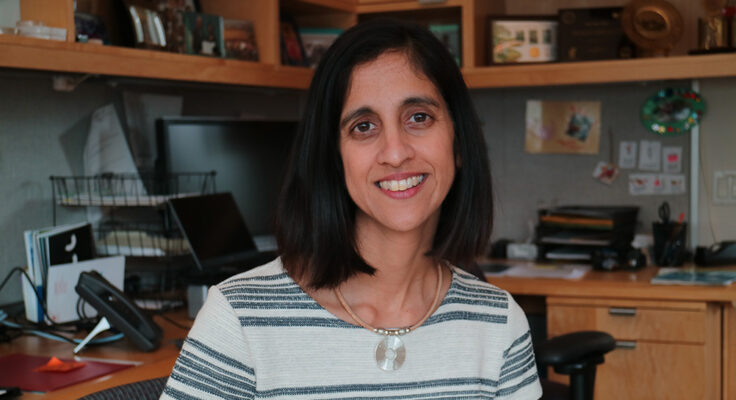The Kenneth Rainin Foundation seeks to improve the lives of people living with Inflammatory Bowel Disease (IBD). Our grantmaking aims to support the translation of research into diagnostics, new therapies and biomarkers of mucosal healing that serve patients directly.
Evaluating the impact of our grantmaking is essential, and we consider a variety of indicators, including researcher publications in scientific and medical journals. Over the last year, prominent journals featured cutting-edge advances by five Rainin Foundation grantees highlighted below. In addition, Dr. Tejal Desai, co-chair of our Scientific Advisory Board, co-authored a compelling call to fund Black researchers.
“These publications reflect the cornerstones of our Health strategy—translational science, novel ideas with clinical relevance, and new targets for disease treatment.”
Laura Wilson, PhD, Director, Health Strategy & Ventures
Spotlighting Patient-Centered Research
Our strategic focus on translational science supports clinically relevant research that offers new targets for IBD treatment. Dr. John Chang published an important overview of IBD research in the New England Journal of Medicine. This journal has a high impact factor among scientific publications, making Dr. Chang’s review particularly notable at a relatively early stage of his career. His article considers the pathophysiology of IBD subtypes and the complex factors influencing disease. It also examines available therapies and the challenges and recent advances in IBD research. In the process, he identifies salient points for future research. As a clinician, Dr. Chang’s work has significant implications for IBD patients.
“Together, these current and future research efforts may lead to paradigm-shifting discoveries, new therapies, and ultimately, improved care for patients with IBD.”
John Chang, MD, PhD
A Cornell-led project with Dr. Iwijn De Vlaminck is also widely applicable. The collaborators built on earlier work to develop a noninvasive blood test for infectious and immune-related disease using cell-free DNA. Their novel technology can be used to both identify the presence of infection, while also quantifying the degree of damage to specific tissue. They used it to measure gut bacteria and intestinal and systemic inflammation associated with Crohn’s disease. As the pandemic emerged, the team looked at how the blood test could track organ injury from COVID-19. Doctoral student Alex Cheng co-authored a paper in Cell Med detailing their findings and the broad potential for patient care.
“It could be used to assess disease severity and help stratify patients in the care system.”
Irwin De Vlaminck, PhD
Research into a vexing clinical problem by Ken Cadwell, PhD and his collaborators at New York University appeared in ScienceDaily. Their study showed that a surgical procedure meant to counter ulcerative colitis may trigger a common secondary immune system attack. Typically used as a treatment of last resort, the “J-pouch” procedure replaces damaged tissue in the colon with healthy tissue from the small intestine. More than half of these patients develop “pouchitis” in the healthy tissue. Yet the specific nature of that secondary inflammatory reaction and how to treat it wasn’t understood until now. Their findings indicate that immune cells attacking the colon in ulcerative colitis are the same types attacking the J-pouch. Their newfound understanding of pouchitis clarifies how to treat it and may lead to identifying prevention strategies.
A Call To Fund Black Scientists
Dr. Tejal Desai brings valuable expertise and leadership to our Scientific Advisory Board and is an influential voice in science. With her bioengineering co-authors, Dr. Desai published a strong call for racial equity in federal funding in Cell. Their data-driven critique of the National Institutes of Health (NIH) examines studies of racial disparities in NIH funding and its long-term impacts on Black scientists and faculty. They cite stark contradictions between NIH grantmaking and its policies to “promote the…diversity of the biomedical research workforce.” They also lay out solutions for “dismantling this barrier for Black scientists.” The article’s publication in a high-impact journal amplifies the field’s growing awareness of these common disparities and how they harm science.
New Insights Into The Microbiome
Dr. Randy Longman and fellow investigators at Weill Cornell and Memorial Sloan Kettering have pinpointed a bacterial “Achilles heel” in Crohn’s disease. Patients with Crohn’s disease have an overabundance of a type of gut bacteria called adherent-invasive Escherichia coli. Their research, published in ScienceDaily, identified a bacterial metabolite that triggers inflammation when it interacts with immune system cells in the intestinal lining. Using a mouse model of Crohn’s disease, they were able to reduce gut inflammation by interfering with this metabolic process. Their findings suggest avenues for developing therapeutic alternatives to antibiotic treatments that kill beneficial bacteria in the gut.
“If we can develop small molecule drugs or use dietary modifications, we may be able to reduce intestinal inflammation in patients with Crohn’s disease with fewer side effects.”
Randy Longman, MD, PhD
Research by Dr. Iliyan Iliev at Weill Cornell Medicine provided surprising insight into the growth of antibodies in response to common intestinal fungi. The study, published recently in Cell, grew out of Dr. Iliev’s work on the mycobiome in patients with IBD. People with IBD often carry larger than normal populations of fungi in their guts. In a series of experiments, his team found that normal intestinal fungi appear to induce the production of anti-fungal antibodies. These antibodies target multiple species of potentially pathogenic fungi like the emerging pathogenic yeast Candida auris. In recent years, it has plagued immunosuppressed patients and the elderly with increasing frequency and severity. Dr. Iliev’s findings could lead to new therapies against these infections.
“Those fungi just educate that immune response.”
Iliyan Iliev, PhD

